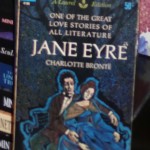Earlier this week I caught a feed on Flavorpill that I’ve been waiting all week to talk about. I know; the whole point of blogging is to be in the now, not running a week behind, but I just can’t get it done. And I don’t understand how other people who work 9-6 find time for all that blogging [note to Dolly Parton: nobody works 9-5 any more. To get paid for an 8 hour work day, you have to work 8 hours; lunch is on you]. They must squeeze it in during lunch. I can’t. I write Help for a living and, for my own sanity, I really need that daily break to clear my brain and rest my eyes.
Anyway. Emily Temple’s piece, in honor of Women’s History Month, presented 10 of the Most Powerful Female Characters in Literature. It was a good list. Of course everyone who reads it is going to have their own ideas of how it ought to be changed, but I think Temple covers this by calling it “10 of the Most…” and not “The 10 Most….” I’m hoping and I’m hoping you all read it and start to have your own ideas. Me, I was very pleased with Temple because #1 on her list was the guiding light of my own childhood, Jane Eyre.

My first copy of "Jane Eyre". Notice the price.
My first literary role model was Jo March of Little Women. She was strong, intelligent, funny and had an enormous heart. I loved Jo most when she was writing blood-&-thunder yarns to pay the family bills; she inspired me to think I could write. Then she married Professor Bhaer and stopped being the star of her own story. I soon moved on to Jo’s creator and prototype, Louise May Alcott, and then to another strong fictional woman, Charlotte Brontë’s Jane Eyre. Young Jane was small and helpless, much more like the young me than Jo March. Like the stories of many (male) heroes, hers begins in obscurity and has her pass through a series of trials until she reaches her full powers. With her moral strength and treasured autonomy, Jane gave me strength. For a good quarter century starting from when I was ten, I read Jane Eyre annually. I think its time to start reading her again.
Who else would I add to Temple’s list? I think all little girls should run around with Madeleine and Eloise. As they grow, they need to spend time in the woods and prairies with Laura Ingalls and her undervalued courageous sister Mary, and in The Secret Garden with Mary Lennox. When they’re ready to meet Hermione Granger (who does make Temple’s list), they shouldn’t neglect Harriet the Spy and Meg Murry (btw, Happy Golden Anniversary to A Wrinkle in Time!).
Grown up girls have a wide range of options, reflecting different interpretations of what a powerful woman should be. Listen to the fierce debate between the Carrie and Samantha camps and you’ll know what I mean (disclosure: I find everyone in Sex and the City equally irritating and think they’ve ruined the shoe industry for those of us who actually have to walk in our shoes). I’m particularly fond of those seriously beleaguered fighters on the side of justice, Kim Harrison’s Rachel Morgan and Sue Grafton’s Kinsey Millhone. And then, there is one of my all-time favorites, Marie Goesler Finn, aka “Madame Max”, the best supporting player in Anthony Trollope’s “Palliser” books and a woman I would have been proud to be.
A couple of years before she died, Anne Bancroft was interviewed in conjunction with a TV movie. This brilliant actress hadn’t been working much and, in trying to get to the crux of this, the interview asked why there weren’t better roles for women. Bancroft said (to my best recollection) “there can’t be better roles for women in film until there are better roles for women in life.”
And yet, there have always been an abundance of good female characters in novels. Another good reason to try and keep written fiction alive.
Happy Women’s History Month!

